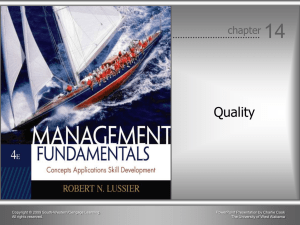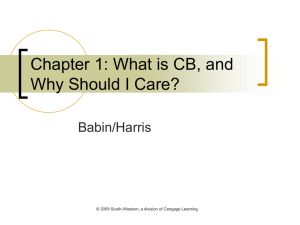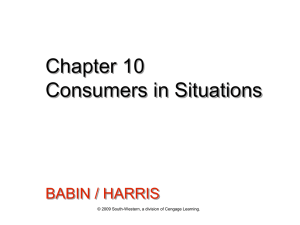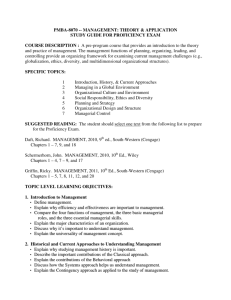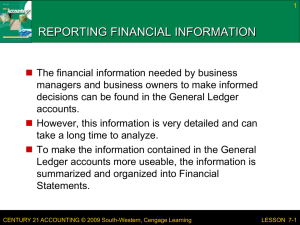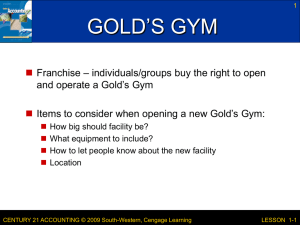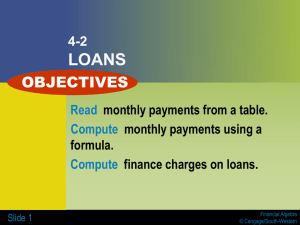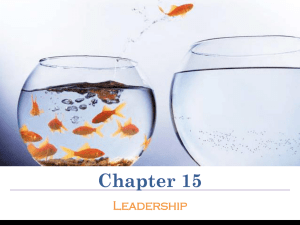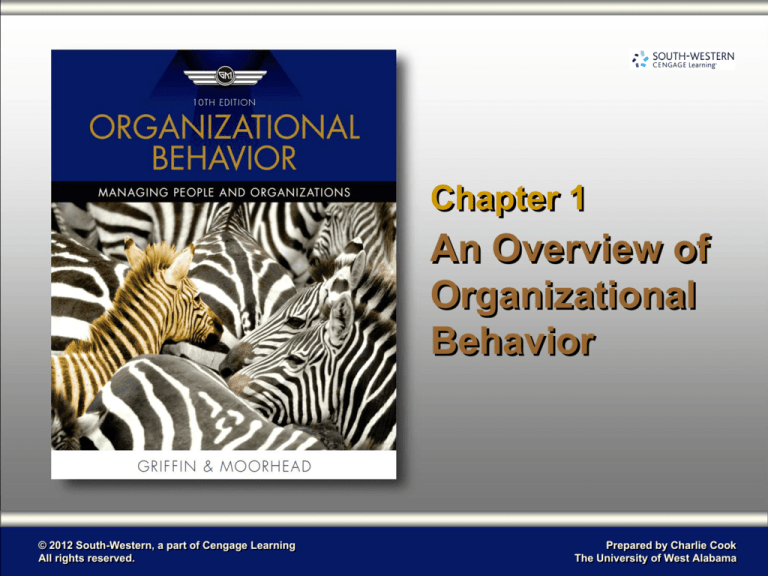
Chapter 1
An Overview of
Organizational
Behavior
©
© 2012
2012 South-Western,
South-Western, aa part
part of
of Cengage
Cengage Learning
Learning
All
All rights
rights reserved.
reserved.
Prepared
Prepared by
by Charlie
Charlie Cook
Cook
The
The University
University of
of West
West Alabama
Alabama
Chapter Learning Objectives
After studying this chapter you should be able to:
1. Define organizational behavior.
2. Identify the functions that comprise the management process
and relate them to organizational behavior.
3. Relate organizational behavior to basic managerial roles and
skills.
4. Describe contemporary organizational behavior.
5. Discuss contextual perspectives on organizational behavior.
6. Describe the role of organizational behavior in managing for
effectiveness
© 2012 South-Western, a part of Cengage Learning
1–2
What is Organizational Behavior?
• Organizational behavior (OB) is the study of:
–Human behavior in organizational settings
–The interface between human behavior and the
organization
–The organization itself
© 2012 South-Western, a part of Cengage Learning
1–3
1.1
The Nature of Organizational Behavior
© 2012 South-Western, a part of Cengage Learning
1–4
The Importance of Organizational Behavior
• Organizations can have a powerful influence on
our lives:
–Most people are born and educated in organizations
–Most people acquire most of their material
possessions from organizations
–Most people die as members of organizations
–Many of our activities are regulated by governmental
organizations
–Most people spend most of their lives in organizations
© 2012 South-Western, a part of Cengage Learning
1–5
Why Study OB?
• Studying organizational behavior can clarify
factors that affect how managers manage by:
–Describing the complex human context of
organizations
–Defining the associated opportunities, problems,
challenges, and issues
–Isolating important aspects of the manager’s job
–Offering specific perspectives on the human side of
management
© 2012 South-Western, a part of Cengage Learning
1–6
Why Study OB? (cont’d)
• Studying OB helps managers understand:
–The behaviors of others in the organization
• Personal needs, motives, behaviors, feelings and career
dynamics
• Attitudinal processes, individual differences, group dynamics,
inter group dynamics, organization culture, power, and
political behavior
–Interactions with people outside of the organization
and other organizations
–The environment, technology, and global issues
© 2012 South-Western, a part of Cengage Learning
1–7
Organizational Behavior and
the Management Process
• Management
Functions
–Planning
–Organizing
–Leading
–Controlling
© 2012 South-Western, a part of Cengage Learning
• Resources Used
by Managers
–Human
–Financial
–Physical
–Information
1–8
Functions of Management
Planning
Determining an organization’s desired
future position and the best means of
getting there
Organizing
Designing jobs, grouping jobs into units,
and establishing patterns of authority
between jobs and units
Leading
Getting organizational members to work
together toward the organization’s goals
Controlling
Monitoring and correcting the actions of
the organization and its members to keep
them directed toward their goals
© 2012 South-Western, a part of Cengage Learning
1–9
1.2
Basic Managerial Functions
© 2012 South-Western, a part of Cengage Learning
1–10
Organizational Behavior and
the Manager’s Job
Basic Managerial Roles
Interpersonal
© 2012 South-Western, a part of Cengage Learning
Informational
Decision-Making
1–11
1.1
Important Managerial Roles
Category
Role
Example
Interpersonal
Figurehead
Attend employee retirement ceremony
Leader
Encourage workers to increase productivity
Liaison
Coordinate activities of two committees
Monitor
Scan business publications for information
about competition
Disseminator
Send out memos outlining new policies
Spokesperson
Hold press conference to announce new plant
Entrepreneur
Develop idea for new product and convince
others of its merit
Disturbance handler
Resolve dispute
Resource allocator
Allocate budget requests
Negotiator
Settle new labor contract
Informational
Decision Making
© 2012 South-Western, a part of Cengage Learning
1–12
Critical Managerial Skills
Technical
Skills necessary to accomplish
specific tasks within the organization
Interpersonal
Skills used to communicate with,
understand, and motivate individuals
and groups
Conceptual
Skills used in abstract thinking
Diagnostic
Skills to understand cause-effect
relationships and to recognize optimal
solutions to problems
© 2012 South-Western, a part of Cengage Learning
1–13
1.3
Managerial Skills at Different Organizational Levels
© 2012 South-Western, a part of Cengage Learning
1–14
Contemporary Organizational Behavior
• Characteristics of the Field
– Interdisciplinary in focus
– Descriptive in nature
• Basic Concepts of the Field
1. Individual processes
2. Interpersonal processes
3. Organizational processes/characteristics
© 2012 South-Western, a part of Cengage Learning
1–15
1.4
The Framework
for Understanding
Organizational
Behavior
© 2012 South-Western, a part of Cengage Learning
1–16
Contemporary Organizational Behavior
Systems Perspective
Contextual
Perspectives on
Organizational
Behavior
Situational Perspective
Contingency
Interactional
© 2012 South-Western, a part of Cengage Learning
1–17
The Systems Perspective
• System
–An interrelated set of elements that function as a
whole—inputs are combined/transformed by
managers into outputs from the system
• Value of the Systems Perspective
–Underscores the importance of an organization’s
environment
–Conceptualizes the flow and interaction of various
elements of the organization.
© 2012 South-Western, a part of Cengage Learning
1–18
The Situational Perspective
• The Situational Perspective
–Recognizes that most organizational situations and
outcomes are influenced by other variables
• The Universal Model
–Presumes a direct cause-and-effect linkage between
variables
–Complexities of human behavior and organizational
settings make universal conclusions virtually
impossible
© 2012 South-Western, a part of Cengage Learning
1–19
1.5
The Systems Approach to Organizations
© 2012 South-Western, a part of Cengage Learning
1–20
1.6
Universal Versus Situational Approach
© 2012 South-Western, a part of Cengage Learning
1–21
Interactionalism: People and Situations
• Interactionalist Perspective
–Focuses on how individuals and situations interact
continuously to determine individuals’ behavior
–Attempts to explain how people select, interpret, and
change various situations.
© 2012 South-Western, a part of Cengage Learning
1–22
1.7 The Interactionalist Perspective on Behavior in Organizations
© 2012 South-Western, a part of Cengage Learning
1–23
Managing for Effectiveness
• Managers work toward accomplishing the
various goals (outcomes) that exist at
specific levels in an organization:
–Individual-level outcomes
–Group-level outcomes
–Organizational-level outcomes
© 2012 South-Western, a part of Cengage Learning
1–24
1.8
Managing for Effectiveness
© 2012 South-Western, a part of Cengage Learning
1–25
Organizational Behavior in Action
• Based on your reading of the chapter opening
case:
–What is employee turnover so low at Wegmans?
–Which basic managerial roles and skills is Danny
Wegman using to show his employees that the
organization really cares about them?
–Why haven’t competitors adopted the Wegmans’
employee-focused strategy?
© 2012 South-Western, a part of Cengage Learning
1–26

